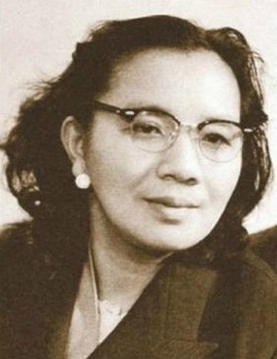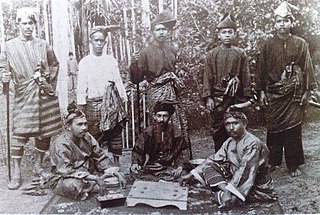Abu Samah Mohd Kassim (February 1926 - 7 April 2009) was one of central committee member of the Malayan Communist Party during 1975. He was an important Malay communist in the 1970s.
Abu Samah Mohd Kassim (February 1926 - 7 April 2009) was one of central committee member of the Malayan Communist Party during 1975. He was an important Malay communist in the 1970s.
Abu Samah was born in the district of Semantan, Temerloh, Pahang. Dato' Bahaman, a well-known Malay leader whom headed the rebellion against British intervention in politics and the administration of Pahang in 1891–1892, is his great-granduncle.
During 1946, he joined the nationalist movement and became a member of the Parti Kebangsaan Melayu Malaya and Angkatan Pemuda Insaf. In 1948, he joined the armed struggle for independence through 10th Regiment, the Malayan National Liberation Army. Under the order of Malayan Communist Party, in 1953, he moved from the forest in Pahang to the south of Thailand until 1989, along with the 10th Regiment. From 1969 to 1976, he led the group of troops, around 40 people, to Hulu Kelantan. He had fought with the Malaysian military during Operasi Gonzales.
At the age of 80, he settled in Sukhirin District, Narathiwat Province, southern Thailand, with Abdullah CD and the former members of the 10th Regiment, who chose not to return to Malaysia.

Abdul Razak bin Hussein was a Malaysian lawyer and politician who served as the second prime minister of Malaysia from 1970 until his death in 1976. He also served as the first deputy prime minister of Malaysia from 1957 to 1970. He is referred to as the Father of Development.

The Royal Ranger Regiment is an infantry regiment of the Malaysian Army. Although it is second in seniority to the Royal Malay Regiment, the RRD can trace its origins back to the mid 19th century and the establishment of The Sarawak Rangers, the peacekeeping force in the Sarawak region. This force was absorbed by the Sarawak Constabulary in 1932, but the name was revived in 1941 as a British Colonial unit; this unit commanded by British Lieutenant Colonel C.M. Lane was captured by the Japanese in 1942.

The Malayan Communist Party (MCP), officially the Communist Party of Malaya (CPM), was a Marxist–Leninist and anti-imperialist communist party which was active in British Malaya and later, the modern states of Malaysia and Singapore from 1930 to 1989. It was responsible for the creation of both the Malayan Peoples' Anti-Japanese Army and the Malayan National Liberation Army.
Tunku Tan Sri Osman was the first Malaysian Armed Forces Chief of Staff. He was a nephew of Tunku Abdul Rahman, Malaysia's first Prime Minister as well as a cousin of Sultan Abdul Halim, Tunku Abdul Malik, Tunku Annuar and Sultan Sallehuddin since their fathers and Tunku Abdul Rahman were brothers. General Tunku Osman was known for his strong principles and self-discipline as well as highly respected by the ranks and files of the army.

Bukit Kepong incident was an armed encounter in 1950 during the Malayan Emergency between the Federation of Malaya Police and the guerrillas of the Malayan National Liberation Army (MNLA), the armed wing of the Malayan Communist Party (MCP). This conflict took place in an area surrounding the Bukit Kepong police station in Bukit Kepong. The wooden station was located on the river banks of the Muar River, about 59 km from Muar town, Johor.
This article lists important figures and events in Malayan public affairs during the year 1955, as well as births and deaths of significant Malayans.
This article lists important figures and events in Malayan public affairs during the year 1948, together with births and deaths of significant Malayans. Malaya left the British colonial Malayan Union; the Federation of Malaya took place on 1 February.
This article lists important figures and events in the public affairs of British Malaya during the year 1946, together with births and deaths of prominent Malayans. Malaya remained under British Military Administration until the establishment of the Malayan Union on 1 April.

Karak is a small town in Bentong District, Pahang, Malaysia. Located at the foothills of Malaysia's Titiwangsa Mountain Range, it is well known as a rest town along the Federal Route 2 from Kuala Lumpur to Kuantan and lends its name to the Karak Highway, or the Kuala Lumpur-Karak Expressway linking it to the country's capital of Kuala Lumpur.

Rashid Maidin, sometimes given as Rashid Mahideen, was a senior leader of the Communist Party of Malaya (CPM).
Abdul Rahman bin Tuanku Imam Nuh was a nobleman and famous Malay warrior best known for his role in the Pahang Uprising (1891–1895) in Pahang, Malaysia during the period of British protectorate. Dato' Bahaman was an Orang Besar Raja – a fief of the Sultan of Pahang.

The Communist insurgency in Malaysia, also known as the Second Malayan Emergency, was an armed conflict which occurred in Malaysia from 1968 to 1989, between the Malayan Communist Party (MCP) and Malaysian federal security forces.

The Royal Malaysia Police trace their existence to the Malacca Sultanate in the 1400s and developed through administration by the Portuguese, the Dutch, modernization by the British beginning in the early 1800s, and the era of Malaysian independence.

Shamsiah Fakeh was a Malaysian nationalist and feminist. She was the leader of Angkatan Wanita Sedar (AWAS), Malaysia's first nationalist women organisation and a prominent Malay leader of the Communist Party of Malaya (CPM). She was the grandmother of Jamaliah Jamaluddin, Member of the Selangor State Executive Council and Member of the Selangor State Legislative Assembly for Bandar Utama.

Cik Dat bin Anjang Abdullah, commonly known as Abdullah CD, was a Malaysian politician who served as chairman and General Secretary of the Communist Party of Malaya (CPM).

Apa Khabar Orang Kampung is a 2007 Malaysian documentary by Amir Muhammad. It was produced by Da Huang Pictures. Like its predecessor The Last Communist, it was banned in its home country but screened in several international film festivals. It premiered at the Berlinale in 2006.
Hamzah bin Abu Samah was a Malaysian politician, lawyer and sports administrator who served as the president of Asian Football Confederation from 9 December 1978 to 1 August 1994. In 2006, he was conferred the FIFA Order of Merit for his contribution towards Asian football. He also one of the fourth Malaysian to join the exclusive club of AFC Diamond of Asia Award with Dato' Seri Najib Tun Razak, Sultan Ahmad Shah and Sultan Abdullah.
Kamarulzaman Teh, who was imprisoned in the Federation of Malaya for 22 years, is the longest political detainee in Malaysia's history. He was the leader of Angkatan Pemuda Insaf (API), who fought the Japanese during the Japanese occupation of Malaya.

Pahang Malays are a sub-group of Malay people native to the state of Pahang, in the east coast of Peninsular Malaysia. With population of approximately 1.08 million people, they constitutes 70% of Pahang state's population, making them the dominant ethnic group in the state. Their language, Pahang Malay is one of many Malayan languages spoken in the region that belong to the Malayo-Polynesian group of Austronesian family.
The Malaysian Communist Party (MCP) was a merger of the Communist Party of Malaya/Marxist-Leninist (CPM-ML) and the Communist Party of Malaya/Revolutionary Faction (CPM-RF). Both factions split out from the Malayan Communist Party in the 1970s. MCP traced its roots to splinter groups amongst communist guerrillas in southern Thailand in the 1970s. The party conducted armed struggle in the Malaysian-Thai border areas between 1983 and 1987. The former CPM-RF members lay down their arms on 13 March 1987 and the former CPM-ML members lay down theirs on 28 April 1987. It eventually accepted a deal for cessation of hostilities with the Thai military and its cadres were resettled in 5 'friendship villages'.